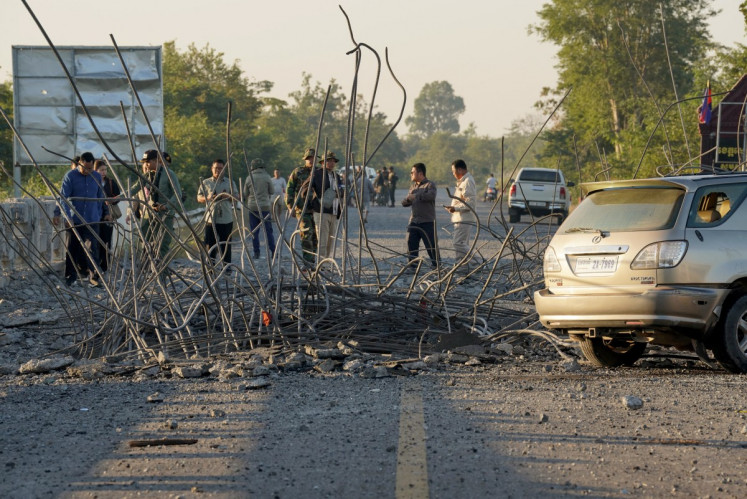Popular Reads
Top Results
Can't find what you're looking for?
View all search resultsPopular Reads
Top Results
Can't find what you're looking for?
View all search resultsIndonesia, outbreaks and halal inoculations
Open wide: A boy receives an oral polio vaccination in Semarang, Central Java
Change text size
Gift Premium Articles
to Anyone
Open wide: A boy receives an oral polio vaccination in Semarang, Central Java. Antara/R. Rekotomo
For decades, Indonesia has been fighting to eradicate endemic diseases, such as hepatitis B, polio, diphtheria, pertussis, tetanus, measles and Haemophilus influenza type B. Since its launch in 1979, the Indonesian Immunization Program has done good work: the nation was declared polio-free by the WHO in 2014.
Nevertheless, public health officials remain alert, for there have been outbreaks of diphtheria and measles in various parts of the nation in recent years.
There were 432 cases of diphtheria reported in Indonesia in 2006, for example. By 2014, the figure dipped 8.7 percent to 394 cases, 74 percent of which involved children under 15.
Meanwhile, there have been 125 measles outbreaks in recent years, including 10,651 cases in 2014, down 7.5 percent from 11,521 cases reported in 2013, according to officials.
'If we manage to reach high and equal coverage [rates] for immunization throughout Indonesia, I believe that we wouldn't have had those outbreaks,' Sri Rezeki S. Hadinegoro, a member of the immunization task force of the Indonesian Pediatrics Association (IDAI), said in Jakarta recently during a media gathering.
Sri, a medical doctor and a PhD, said that Indonesia's universal child immunization level was not bad, coming in at 80.23 percent in 2013.
'Coverage, however, was uneven because the rate in Central Kalimantan, South Sulawesi and Papua was only between 52.4 percent and 74 percent,' she added.
Yuliandi, an official with the Health Ministry's disease control and environmental health directorate general, said that public resistance had also hampered the efforts to immunize children.
Some members of the nation's Muslim majority are concerned that vaccines contain ingredients that are haram, or unlawful according to Islamic teaching. For example, some vaccines, such as ones for polio, reportedly contain swine enzymes ' something that Muslims consider haram.
'We've gone through two experiences regarding rejections against immunization. First, a father said no to immunizations as a 'human rights' issue. Second, a rejection came from a religious leader in Pasuruan, East Java, because he believed that vaccines were haram,' Yuliandi said.
'The father said, 'I don't want you to inject my children. They are my children, I don't want them to get cold [after the vaccination] and it is my right to do so. Please respect it,'' Yuliandi said.
A pediatrician readies to administer a measles vaccination. AFP/Getty Images/Joe Raedle
Fortunately, a local official was on hand to diffuse the situation with humor.
'The kepala desa [village head] replied: 'We respect your rights, but to make things fair, please do give respect to other families here, who have the same rights to have their children be free from diseases,'' Yuliandi said, quoting the official.
The kepala desa suggested that the father build and move to an 'anti-immunization community' outside the village. The ploy worked, he said, and the father allowed his children to get vaccinated.
Meanwhile, in the Pasuruan case, Yuliandi said that he told the religious leader about an obligatory program in Saudi Arabia requiring children be immunized before enrolling in elementary school.
'I didn't bother telling him about halal or haram, I just mentioned the Saudi Arabia's policy over immunization and it was all settled,' Yuliandi said, adding that he got the information on Saudi Arabia's policy while on pilgrimage last year.
Also speaking at the event, Hamdan Rasyid, a member of Indonesian Ulema Council (MUI), said that only three vaccines were certified halal by the council, which sets standards for the nation's Muslims.
The vaccines are Menveo Meningococcal by Novartis and Mevac ACYW135 by Tianyuan for meningitis, and Rotarix for rotavirus for infants by GSK.
According to Hamdan, the MUI fully supports the government's immunization campaign, saying that the council believes vaccinations are essential and permissible, in line with Islamic teachings that encourage the faithful to maintain their health.
'In Islam, we are allowed to get vaccinated in emergency cases. So, if there are vaccines that contain something haram ' for example swine enzymes, as reportedly exist in polio vaccines ' and getting injections is done as an effort to stay healthy, then it is permissible until we get the halal ones.'
Sri added that drugs and vaccines produced by state-owned pharmaceutical firm Bio Farma have all gone through extensive testing, including tests to determine if they contain haram ingredients.
'We only use drugs and vaccines, both local and imported, that have been registered by the BPOM [Food and Drug Monitoring Agency], which means that they] have passed safety and effectiveness tests, including on their halal contents,' Sri said.
Meanwhile, Indonesia plans to produce its own supplies of vaccines for H5N1 bird flu by 2015, for tuberculosis by 2020 and for dengue fever in 2025.
The measles virus - Cynthia Goldsmith, CDC













